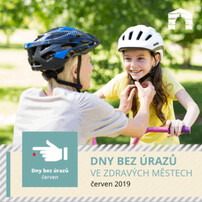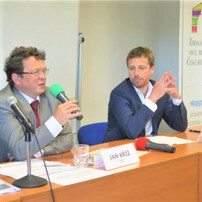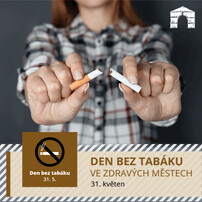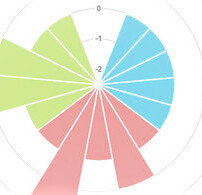 |
Newsletter
Healthy Cities of the Czech Republic
|
 |
|
|
V-VI/2019 (EN)
|
 |
The 50th Annual Healthy City School – work, inspiration and fun | Tabor, June 2019
Where /When/Why: Tabor/ 5 – 7 June 2019 / sharing, inspiration, experience, partnership among cities, towns and regions
Participants: > 130
Presentations: 14
Training sessions: 3
The Good Practice Stamp Prizes were awarded for exemplary good practice:
Tabor: Alternative fuels in municipal technology
Jilemnice: Coordinated construction of individual housing
Others topics covered included (in Czech language):
- Introduction of the city of Tabor
- Alternative fuels in municipal technology
- Ministry of the Interior: Concept of client-oriented public administration 2030
- Ministry of Labour and Social Affairs: New opportunities for green purchasing
- Union of Towns and Municipalities of the Czech Republic: Partnerships, activities, projects
- Czech Healthy Cities
- Healthy Cities Good Practice
- We can measure the sustainability of urban living
- UNIT architekti (UNIT architects): Coordinated construction of individual housing
- Jilemnice: Coordinated construction of individual housing
- Jesenice: We manage our city smartly
- Library as an educational, information, cultural and community centre of a municipality
- SEVEN, Prestice: BEACON – An example of a successful decarbonisation strategy at municipal level
- REKOLA: The Project of bikesharing in cities and towns
For the two subsequent days, the participants trained on a range of topics, including social media skills, and tested the online tools offered. Furthermore, they discussed their experiences from cities and towns and inspirations such as re-use centres, how to make children move more or how to interconnect regional products and social business.
Besides the thought-provoking specialized session, a great complementary program was prepared such as the tour of the historic city centre, the chocolate museum, a joint run or the rock opera Jesus Christ Superstar.
The baton of the Healthy Cities Schools was handed over to: Hodonin – 6 – 8 November 2019
The outputs and photos from the Healthy Cities School are available HERE.
This event was supported from the funds of the European Social Fund provided from the Operational Employment Programme to implement the project.
|
 |
Czech Healthy Cities organised Days without Injuries | June 2019
The Days without Injuries campaign which involves annually a number of Healthy Cities, Towns and Regions was held in the first half of June with the focus on injury prevention. Organised as part of this campaign, the awareness activities are primarily aimed at road traffic injuries and injuries in schools and sports grounds. Since the most vulnerable group to be involved in road traffic accidents are children and older persons, a series of lectures are held in kindergartens and primary schools. Special events are also dedicated to the safety of older persons. Furthermore, first aid training to provide assistance in case of injuries and accidents is an essential part of the campaign.
Targeted prevention can effectively reduce the rate of injuries and accidents and mitigate its consequences. This has already been confirmed in many cities and through measurements as well. To prevent road traffic accidents and injuries, cities can use proven methodologies such as the “Safe Journey to School” programme or the “Ride the Bike only with a Helmet” campaign. Days without Injuries in Healthy Cities are also supported by the National Institute of Public Health and its locally competent offices.
The activities of Czech Healthy Cities, Towns and Regions concerning the Days without Injuries can be found on: www.ZdravaMesta.cz/dbu
|
 |
The “Collaboration between Cities and Architects" workshop - views from practice and possibility of grants | May 2019
With the participation of more than a hundred interested parties from all over the Czech Republic, the nationwide Healthy Cities workshop, which took place on 13 May in Prague, drew attention to two highly topical issues that have a profound impact on the future appearance of the places in which we live. The first issue is the collaboration between cities and architects and the second is water management.
The event was held under the aegis of the Minister for Regional Development and the Minister for the Environment. The Ministry for Regional Development was represented by its Deputy Minister David Koppitz delivering a speech on its behalf and the Ministry for the Environment was represented by its Deputy Minister Jan Kriz who also gave a speech at the event.
The ensuing session, focused on collaboration between cities and architects, was moderated by the architect Filip Tittl (Czech Technical University in Prague, UNIT architekti). He pointed out right in the beginning that the role of an architect could be more varied than usual in most cities. All speakers agreed that an urban architect is an important intermediary between a politician who will decide on a particular project and a planner who will implement it. The role of the urban architect should not be restricted only to a mere “overseer” watching over a zoning plan being respected. Conversely, it is highly desirable to involve them actively in the decision-making process on urban development issues (e.g. investment, territorial planning, upkeep of green areas etc.).
The speakers of this session also reflected on the role of an urban architect (Petr Lesek, Projektil architekti) and described concrete approaches and examples of collaboration with architects in the territory as illustrated by the examples of the city of Litomysl (Antonín Dokoupil, Department for Urban Development of Litomysl) and the small South Bohemian municipality of Usilne (Ondrej Synek, re:architektiy). The session was closed by a discussion between speakers and participants highlighting, among other things, the significance of the role that urban architects play in the issue of adaptation to climate change as initiators of concrete solutions.
The session devoted to water management was opened by the moderator – architect Vojtech Lekes (NEXT institute) who introduced a prototype of collecting rainwater installed in the centre of Brno as urban furniture. It is a simple example of how to efficiently collect water in a city and use it to water urban green spaces. Martin Vanecek (Environment Department of Brno) followed up with concrete examples of water management mentioning e. g. the park outlets in the form of drainage piping for irrigation, the use of water collected from tower blocks rooftops to fill up a retention basin in the park called “Park pod plachtami“, the preparation of revitalisation of the Svratka river, green tram tracks and the city´s incentive program to promote the creation of green roofs. Radim Vitek (Office of the Architect of the City of Brno and CzWA – the Czech Water Association) introduced possible approaches to managing rainwater – an investment approach (concrete projects) and an organisational approach (systemic measures). In particular, he stressed that this issue has a huge political potential requiring an interdisciplinary approach and a change of established practices. Cities still have a long way to go with this issue. This session was closed by Vendula Zahumenska (Investor Zahumny), a lawyer with a long-term professional experience in the area of urbanism and adaptation to climate change. She emphasized the legal aspect of the issue at hand and mentioned the importance of careful preparation of contracts with investors (especially the role of planning agreements) and the fundamental principles of the link between adaptation measures and both zoning plans and regulation plans.
Introduced Martin Kubica, director of the OPE Management Section, the final session of the workshop was devoted to the issue of the funds from the State Environmental Fund of the Czech Republic earmarked for water management. Up-to-date information and numerous successful projects can be found on the website of the State Environmental Fund: https://www.priorita.cz/clanky/uspesne-projekty. The presentations were followed up by individual consultations between the participants of the workshop and the staff of the State Environmental Fund on the projects in the pipeline.
For further information, click HERE.
This event was supported from the funds of the European Social Fund provided from the Operational Employment Programme to implement the project.
|
 |
The World No Tobacco Day campaign took place on 31 May
The World No Tobacco Day is an international campaign aimed at preventing tobacco-related diseases. The campaign is celebrated annually on 31 May. It is supported by the World Health Organization (WHO) and joined actively by a number of Czech Healthy Cities members. The use of tobacco products is still one of the leading causes of deaths both in the European Region and worldwide.
The focus of the World No Tobacco Day 2019 was on the impact of tobacco on the lung health of people from all over the world. The aim of this year´s campaign called “Tobacco and Healthy Lungs” is to raise awareness on:
- fundamental role the lungs play for the health and well-being of all people;
- risks posed by tobacco smoking and second-hand smoke exposure (i. e. passive smoking);
- negative impact of tobacco on human lung health, from cancer to chronic respiratory diseases;
- emergence of evidence on the link between tobacco smoking and tuberculosis deaths;
- actions and measures that key target groups, including the public and governments, can take to reduce the risks to lung health posed by tobacco;
- magnitude of deaths and illness globally from lung diseases caused by tobacco, including chronic respiratory diseases and lung cancer.
On the occasion of the World No Tobacco Day, a series of anti-smoking awareness events are held annually in the Czech Republic. In addition to the WHO support, the campaign is also supported by the National Institute of Public Health (for more info, see www.szu.cz). Furthermore, Healthy Cities, Towns and Regions hold a number of events such as the “Paths to Clean Air”, contests and theatre performances with anti-smoking themes for children, and lectures and health advice for adults.
The overview of activities of Healthy Cities, Towns and Regions concerning the World No Tobacco Day can be found on: www.ZdravaMesta.cz/dbt.
|
 |
Webinar: Online Project Inventory – projects according to priorities and impacts | May 2019
A special Healthy Cities webinar sequel, held on 10 May 2019, was devoted to an online tool called PROJECT INVENTORY.
The online project inventory, provided by Czech Healthy Cities, enables to centralize projects in the pipeline of the whole local authority in one place and make them available online for authorised staff members or committees or visualise them for the public.
Further information and presentations are available HERE.
This event was supported from the funds of the European Social Fund provided from the Operational Employment Programme to implement the project.
|
|

The Newsletter is published by Healthy Cities of the Czech Republic, contact: HCCZ Office.
All our Newsletters are also available at www.healthycities.cz/newsletter.
The photographs used come from the HCCZ and its members archives.
© HCCZ, 2019




This HCCZ Newsletter was sent to you due to previous cooperation, we are happy to share our news with you. In case you do not want to stay in touch anymore, you can withdraw your email address from the mailing list now or at any point. If you do not wish to receive any emails from us any more, please send us an email ‘STOP’ by replying to this message or to the address info@zdravamesta.cz. Healthy Cities of the Czech Republic National Network. www.HealthyCities.cz
|
|










